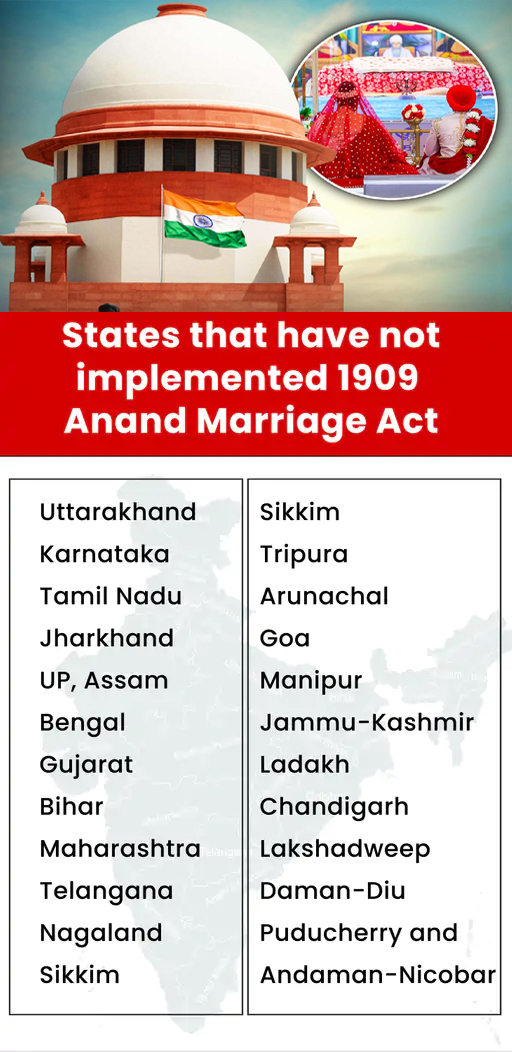Context:
Supreme Court, recently directed 17 states and 7 union territories that have not framed rules under Section 6 of the Anand Marriage Act, 1909 to do so within four months. Until the rules are in place, the Court ruled that Anand Karaj marriages must be accepted and registered under existing marriage laws (civil frameworks) and be treated without discrimination.
About Anand Marriage Act:
The Anand Marriage Act, 1909, recognizes the validity of marriages performed by the Sikh ceremony of Anand Karaj.
· The Act was enacted to eliminate doubts regarding the validity of Sikh marriages and provide legal recognition to the Anand Karaj ceremony. In 2012, the Act was amended to include provisions for registering Anand Karaj marriages.
· However, many states and UTs did not notify rules to operationalise Section 6, causing uneven access to legal recognition.
What Issues the Court Order Does Not Resolve:
Lack of Comprehensive Matrimonial Provisions
-
- The Anand Marriage Act, even with its amendment, does not address divorce, maintenance, or other matrimonial disputes specifically for Anand Karaj marriages. In practice, Sikhs must use the Hindu Marriage Act, 1955 for these issues.
- This means that while registration is now being enforced, when it comes to dissolving marriages, property disputes, inheritance etc., there is still legal dependence on other laws that may not align with Sikh customs or expectations.
- The Anand Marriage Act, even with its amendment, does not address divorce, maintenance, or other matrimonial disputes specifically for Anand Karaj marriages. In practice, Sikhs must use the Hindu Marriage Act, 1955 for these issues.
Identity and Distinct Community Recognition:
The Anand Marriage Act's limitations are also attributed to the lack of recognition of Sikhs as a distinct community, unlike Muslims and Christians. This has led to Sikhs being governed by the Hindu Marriage Act in matters of divorce and other matrimonial disputes, which can be seen as an infringement on their religious identity
Conclusion:
While the Supreme Court's direction to frame rules for registering Sikh marriages is a step in the right direction, it doesn't address the underlying issues with the Anand Marriage Act. The Act's limitations and lack of clarity on divorce and matrimonial disputes continue to be a concern for the Sikh community. A more comprehensive marriage act that recognizes Sikhs as a distinct community and addresses their specific needs may be necessary to resolve these issues.







